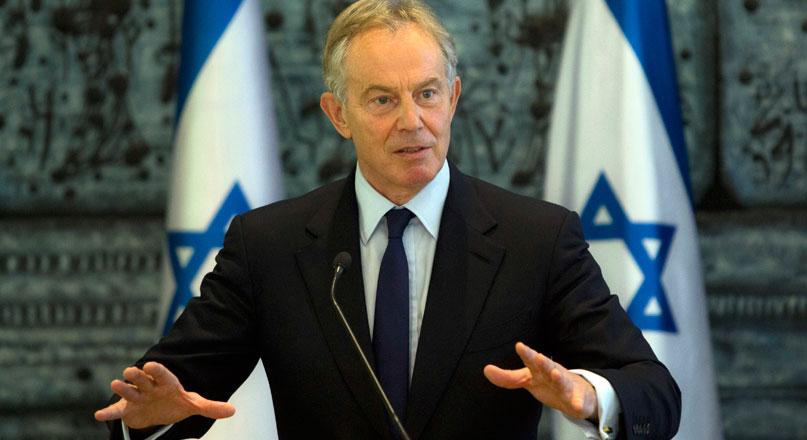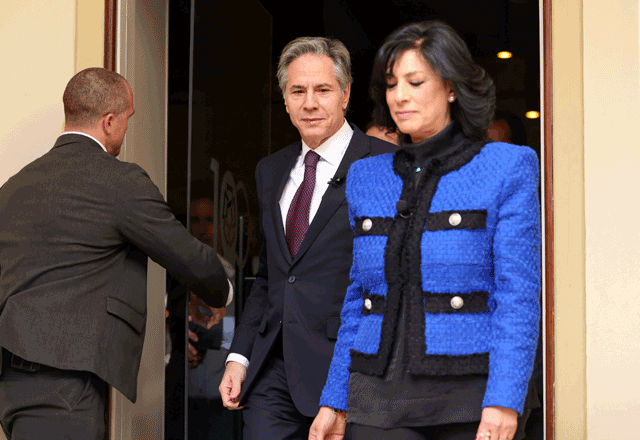You are here
Quartet Mideast envoy Tony Blair resigns
By AP - May 27,2015 - Last updated at May 27,2015

In this July 15, 2014 file photo, former British prime minister and Mideast envoy Tony Blair gestures as he speaks during joint statements with Israel's President Shimon Peres at the president's residence (AP photo)
OCCUPIED JERUSALEM — Former British prime minister Tony Blair on Wednesday stepped down as the international community's Mideast envoy, officials said, leaving a post that began with great promise but which struggled to deliver dramatic changes in its quest to promote peace between Israel and the Palestinians.
The departure reflected the dire state of Mideast peace efforts, which have been stalled for years and show no signs of resuming following the formation of Israeli Prime Minister Benjamin Netanyahu's new government. A top Palestinian official said he was "happy" Blair was leaving, accusing him of ineffectiveness and caving in to Israeli pressure.
Officials familiar with the work of the Quartet in the region said Blair had written a letter to United Nations chief Ban Ki-moon to confirm his resignation. The officials spoke on condition of anonymity pending a formal announcement, which was expected later Wednesday at a meeting of Quartet officials in Brussels. At midday Wednesday, UN spokesman Stephane Dujarric said he could not yet confirm receipt of the resignation letter.
The Quartet — which includes the US, the European Union, Russia and the United Nations — appointed Blair to the post in 2007 with the goal of helping develop the Palestinian economy and institutions. The mission was meant to prepare the groundwork for the establishment of a Palestinian state alongside Israel as part of a peace agreement.
But Blair quickly found himself fighting small battles with Israel over the movement of Palestinian goods and people in the West Bank, and dealing with the difficulties of a Gaza Strip ruled by the Hamas militant group and blockaded by Israel and Egypt.
Hamas, which is shunned as a terrorist group by the US and EU, seized control of Gaza from the rival government of Palestinian President Mahmoud Abbas shortly before Blair took office.
When Blair first took office, then-Israeli prime minister Ehud Olmert and Abbas were conducting a round of peace talks that both sides have said made significant progress. But those talks ultimately failed, and since Netanyahu’s election in 2009, repeated attempts at reviving talks have flopped. Netanyahu’s new government is dominated by parliamentary hard-liners who oppose Palestinian independence, leaving the goal of a two-state solution as elusive as ever.
One official said Blair had suffered “frustration” with the limited authority of his mandate, which did not include a political role. The official also said that Blair felt his office has a strong leadership team and that now is the right time to move on.
According to his office’s website, Blair’s office succeeded in helping remove dozens of Israeli checkpoints in the West Bank, easing the movement of workers and Palestinian products to markets. He also helped boost tourism in the West Bank town of Bethlehem, helped secure thousands of permits for Palestinian laborers to work in Israel, helped engineer a $350 million mobile phone investment in the West Bank, creating thousands of jobs and also pressed Israel to allow limited exports out of blockaded Gaza.
Even so, his efforts often disappointed the Palestinians, who accused him of being ineffective and caving in to Israeli demands too easily.
“I’m happy that Tony Blair is leaving. For the entire eight years, Tony Blair didn’t make any contribution to Palestine,” said Nabil Shaath, a senior Palestinian official. “He never proposed anything that the Israelis didn’t agree to and the entire time he only represented himself. And he worked only to satisfy the Israelis and the Americans.”
Netanyahu’s office declined to comment.
The official said that Blair’s resignation would go into effect in June, but that he hopes to play an “informal” role in promoting the Quartet’s vision of a two-state solution. One area where he could help is developing relations between Israel and the wider Arab world, the official said.
Related Articles
CAIRO — US Secretary of State Antony Blinken arrived Sunday in Egypt at the start of a Middle East trip on which he will look to notch down
US Secretary of State John Kerry said on Saturday that he remains hopeful that the Obama administration’s effort to broker a peace deal between Israelis and Palestinians can succeed, Reuters news agency reported.
RAMALLAH — US President Donald Trump's administration waded into the decades-old Israeli-Palestinian conflict on Tuesday as one of his top a
















